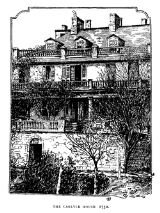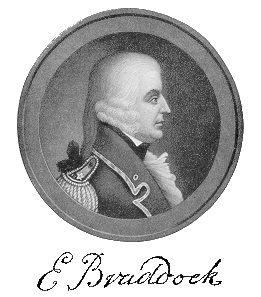
Congress of Alexandria
Encyclopedia
The Congress or Council of Alexandria was a 1755 meeting of Major-General Edward Braddock
, commander-in-chief
of the British Army
in North America
and governors of five of the constituent colonies. These were Robert Dinwiddie
of Virginia, Horatio Sharpe
of Maryland
, Robert Hunter Morris
of Pennsylvania
, William Shirley
of Massachusetts
and James DeLancey
of New York
.
.png) The meeting was held on 15 April 1755 at Carlyle House
The meeting was held on 15 April 1755 at Carlyle House
in Alexandria
, Virginia, home of one of that city's prominent figures, John Carlyle
.
The meeting was an attempt by Braddock to raise funds for a war fund to fight the French in the coming French and Indian War
. The governors rebuffed the request demanding prior funding from the Parliament of the United Kingdom
. The Congress did, however, agree on a war plan for a four-pronged attack against New France
.
Sir William Johnson
of New York, who was also present at the meeting, was appointed Superintendent of Indian Affairs and commissioned a major-general. He was tasked with meeting with the Iroquois Confederacy to keep them neutral in the war.
 The Congress of Alexandria is sometimes noted as the beginning of intercolony dialogue and of the political tension between the colonies and Britain over issues of taxation. Ten years before the Stamp Act of 1765
The Congress of Alexandria is sometimes noted as the beginning of intercolony dialogue and of the political tension between the colonies and Britain over issues of taxation. Ten years before the Stamp Act of 1765
, Braddock wrote from Carlyle House to Thomas Robinson
, a British official that "I cannot but take the liberty to represent to you the necessity of laying a tax upon all his Majesty's dominions in America, agreeably to the result of Council, for reimbursing the great sums that must be advanced for the service and interest of the colonies in this important crisis."
The meeting is reenacted
every year at the Carlyle House.
Edward Braddock
General Edward Braddock was a British soldier and commander-in-chief for the 13 colonies during the actions at the start of the French and Indian War...
, commander-in-chief
Commander-in-Chief
A commander-in-chief is the commander of a nation's military forces or significant element of those forces. In the latter case, the force element may be defined as those forces within a particular region or those forces which are associated by function. As a practical term it refers to the military...
of the British Army
British Army
The British Army is the land warfare branch of Her Majesty's Armed Forces in the United Kingdom. It came into being with the unification of the Kingdom of England and Scotland into the Kingdom of Great Britain in 1707. The new British Army incorporated Regiments that had already existed in England...
in North America
British America
For American people of British descent, see British American.British America is the anachronistic term used to refer to the territories under the control of the Crown or Parliament in present day North America , Central America, the Caribbean, and Guyana...
and governors of five of the constituent colonies. These were Robert Dinwiddie
Robert Dinwiddie
Robert Dinwiddie was a British colonial administrator who served as lieutenant governor of colonial Virginia from 1751 to 1758, first under Governor Willem Anne van Keppel, 2nd Earl of Albemarle, and then, from July 1756 to January 1758, as deputy for John Campbell, 4th Earl of Loudoun...
of Virginia, Horatio Sharpe
Horatio Sharpe
Horatio Sharpe was the 22nd Proprietary Governor of Maryland from 1753 to 1768 under the Restored Proprietary Government.-Biography:...
of Maryland
Province of Maryland
The Province of Maryland was an English and later British colony in North America that existed from 1632 until 1776, when it joined the other twelve of the Thirteen Colonies in rebellion against Great Britain and became the U.S...
, Robert Hunter Morris
Robert Hunter Morris
Robert Hunter Morris, born 1700 in Trenton, New Jersey, died 27 January 1764 in Shrewsbury, New Jersey, was a prominent governmental figure in Colonial Pennsylvania, serving as governor of Pennsylvania and Chief Justice of the New Jersey Supreme Court....
of Pennsylvania
Province of Pennsylvania
The Province of Pennsylvania, also known as Pennsylvania Colony, was founded in British America by William Penn on March 4, 1681 as dictated in a royal charter granted by King Charles II...
, William Shirley
William Shirley
William Shirley was a British colonial administrator who served twice as Governor of the Province of Massachusetts Bay and as Governor of the Bahamas in the 1760s...
of Massachusetts
Province of Massachusetts Bay
The Province of Massachusetts Bay was a crown colony in North America. It was chartered on October 7, 1691 by William and Mary, the joint monarchs of the kingdoms of England and Scotland...
and James DeLancey
James DeLancey
James DeLancey served as chief justice, lieutenant governor, and acting colonial governor of the Province of New York.DeLancey was born in New York City on November 27, 1703, the first son of Etienne DeLancey and Anne-daughter of Stephanus Van Cortlandt...
of New York
Province of New York
The Province of New York was an English and later British crown territory that originally included all of the present U.S. states of New York, New Jersey, Delaware and Vermont, along with inland portions of Connecticut, Massachusetts, and Maine, as well as eastern Pennsylvania...
.
.png)
Carlyle House
Carlyle House is a historic mansion in Alexandria, Virginia, United States, built by Scottish merchant John Carlyle in 1751-53. It is situated in the city’s Old Town on North Fairfax Street between Cameron and King Streets....
in Alexandria
Alexandria, Virginia
Alexandria is an independent city in the Commonwealth of Virginia. As of 2009, the city had a total population of 139,966. Located along the Western bank of the Potomac River, Alexandria is approximately six miles south of downtown Washington, D.C.Like the rest of northern Virginia, as well as...
, Virginia, home of one of that city's prominent figures, John Carlyle
John Carlyle (merchant)
John Carlyle was a Scottish merchant who immigrated to British Colony of Virginia and became a leading landowner and social and political figure in Northern Virginia...
.
The meeting was an attempt by Braddock to raise funds for a war fund to fight the French in the coming French and Indian War
French and Indian War
The French and Indian War is the common American name for the war between Great Britain and France in North America from 1754 to 1763. In 1756, the war erupted into the world-wide conflict known as the Seven Years' War and thus came to be regarded as the North American theater of that war...
. The governors rebuffed the request demanding prior funding from the Parliament of the United Kingdom
Parliament of the United Kingdom
The Parliament of the United Kingdom of Great Britain and Northern Ireland is the supreme legislative body in the United Kingdom, British Crown dependencies and British overseas territories, located in London...
. The Congress did, however, agree on a war plan for a four-pronged attack against New France
New France
New France was the area colonized by France in North America during a period beginning with the exploration of the Saint Lawrence River by Jacques Cartier in 1534 and ending with the cession of New France to Spain and Great Britain in 1763...
.
Sir William Johnson
Sir William Johnson, 1st Baronet
Sir William Johnson, 1st Baronet was an Anglo-Irish official of the British Empire. As a young man, Johnson came to the Province of New York to manage an estate purchased by his uncle, Admiral Peter Warren, which was located amidst the Mohawk, one of the Six Nations of the Iroquois League...
of New York, who was also present at the meeting, was appointed Superintendent of Indian Affairs and commissioned a major-general. He was tasked with meeting with the Iroquois Confederacy to keep them neutral in the war.

Stamp Act 1765
The Stamp Act 1765 was a direct tax imposed by the British Parliament specifically on the colonies of British America. The act required that many printed materials in the colonies be produced on stamped paper produced in London, carrying an embossed revenue stamp...
, Braddock wrote from Carlyle House to Thomas Robinson
Thomas Robinson, 1st Baron Grantham
Thomas Robinson, 1st Baron Grantham, KB, PC was a British diplomatist and politician. He was a younger son of Sir William Robinson, Bt...
, a British official that "I cannot but take the liberty to represent to you the necessity of laying a tax upon all his Majesty's dominions in America, agreeably to the result of Council, for reimbursing the great sums that must be advanced for the service and interest of the colonies in this important crisis."
The meeting is reenacted
Historical reenactment
Historical reenactment is an educational activity in which participants attempt torecreate some aspects of a historical event or period. This may be as narrow as a specific moment from a battle, such as the reenactment of Pickett's Charge at the Great Reunion of 1913, or as broad as an entire...
every year at the Carlyle House.

